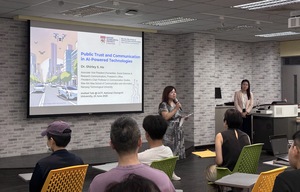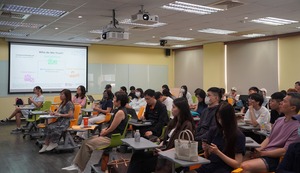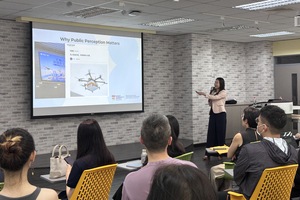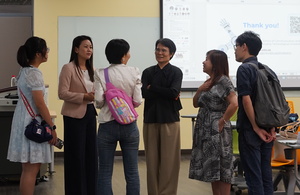Building Bridges Between AI and Society: GCIT Hosts NTU President’s Chair Professor Shirley Ho’s Lecture on Trust and Communication




【Article by GCIT】
As artificial intelligence (AI) continues transforming daily life—from smart cities and autonomous vehicles (AVs) to delivery drones and AI-generated content—the question of public trust in these technologies grows increasingly urgent. On June 25, the Master’s Program in Global Communication and Innovation Technologies (GCIT) at National Chengchi University took a leading role in advancing this critical dialogue by hosting Professor Shirley Ho, President's Chair in Communication Studies at Nanyang Technological University (NTU), for a landmark keynote lecture.
Organized by GCIT and hosted by Distinguished Professor and GCIT Director Trisha Lin, the event brought together students, faculty, and experts from Taiwan and abroad to explore AI’s evolving landscape and the essential role of communication in building public trust.
Professor Ho traced AI’s growth from symbolic rule-based systems to today’s intelligent, real-time “quasi-human partners,” highlighting Singapore’s cutting-edge autonomous shuttle trials and air taxi initiatives also underway in neighboring countries. However, the technical challenges are only part of the story. She emphasized that successful AI integration depends equally on understanding and addressing cultural, social, and psychological factors.
The public’s perception varies widely by region. In Singapore, surveys found that citizens conditionally accept drones, preferring they fly at least 20 meters away, especially in residential areas. China shows enthusiastic adoption, exemplified by drone deliveries at Peking University’s Shenzhen campus that Professor Ho had experienced. Conversely, Western countries face more skepticism with concerns over privacy, surveillance, and safety, fueling public protests and ethical debates, especially amid global conflicts involving AI applications.
Professor Ho framed trust in AI as a willingness to rely on technology based on positive expectations, underscoring studies linking public acceptance not just to the performance of the AI systems, but also to perceived trustworthiness of policymakers, engineers, and media organizations involved. She called for “Explainable AI” — systems that work effectively and are comprehensible to ordinary users — warning against both distrust and dangerous overtrust, notably in areas like healthcare.
The keynote was followed by a lively Q&A session, where issues such as balancing healthy skepticism with technological optimism and addressing challenges like visual media manipulation generated robust interdisciplinary discussion. Professor Ho affirmed that fostering public trust is an ongoing, participatory dialogue requiring culturally informed communication strategies.
By hosting this event, GCIT reinforces its commitment to interdisciplinary education and global dialogue on technology’s societal impact. GCIT regularly invites leading scholars and industry professionals to engage with NCCU’s vibrant academic community, helping bridge the gap between innovation and public understanding.
[此中英文稿和圖片獲中華民國文化部的補助;全球傳播與創新科技碩士學位學程亦獲文化部與教育部高等教育深耕計畫補助。]


 Fax:886-2-29379611
Fax:886-2-29379611